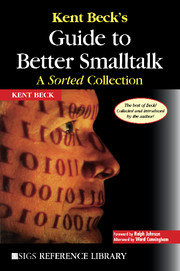Book contents
- Frontmatter
- Contents
- FOREWORD
- PREFACE
- INTRODUCTION
- 1 A DIAGRAM FOR OBJECT-ORIENTED PROGRAMS
- 2 CONSTRUCTING ABSTRACTIONS FOR OBJECT-ORIENTED APPLICATIONS
- 3 PLAYRGOUND: AN OBJECT ORIENTED SIMULATION SYSTEM WITH AGENT RULES FOR CHILDREN OF ALL AGES
- 4 A LABORATORY FOR TEACHING OBJECT-ORIENTED THINKING
- 5 THINK LIKE AN OBJECT
- 6 WHY STUDY SMALLTALK IDIOMS?
- 7 THE DREADED SUPER
- 8 ABSTRACT CONTROL IDIOMS
- 9 VALUEMODEL IDIOMS
- 10 COLLECTION IDIOMS
- 11 AN OBJECTWORKS\SMALLTALK 4.1 WRAPPER IDIOM
- 12 A SHORT INTRODUCTION TO PATTERN LANGUAGE
- 13 WHOLE LOTTA SMALLTALK: THE TECHNOLOGY
- 14 INSTANCE-SPECIFIC BEHAVIOR: HOW AND WHY
- 15 INSTANCE-SPECIFIC BEHAVIOR: DIGITALK IMPLEMENTATION AND THE DEEPER MEANING OF IT ALL
- 16 TO ACCESSOR OR NOT TO ACCESSOR
- 17 INHERITANCE: THE REST OF THE STORY
- 18 INHERITANCE: THE REST OF THE STORY (CONT.)
- 19 HELPER METHODS AVOID UNWANTED INHERITANCE
- 20 IT'S NOT JUST THE CASE
- 21 CRC: FINDING OBJECTS THE EASY WAY
- 22 DEATH TO CASE STATEMENTS
- 23 WHERE DO OBJECTS COME FROM?
- 24 PATTERNS AND SOFTWARE DEVELOPMENT
- 25 DISTRIBUTED SMALLTALK
- 26 WHERE DO OBJECTS COME FROM? FROM VARIABLES AND METHODS
- 27 BIRDS, BEES, AND BROWSERS—OBVIOUS SOURCES OF OBJECTS
- 28 USING PATTERNS: DESIGN
- 29 PATTERNS GENERATE ARCHITECTURES
- 30 SIMPLE SMALLTALK TESTING
- 31 ARCHITECTURAL PROTOTYPE: TELEVISION REMOTE CONTROL
- 32 DEMAND LOADING FOR VISUALWORKS
- 33 GARBAGE COLLECTION REVEALED
- 34 WHAT? WHAT HAPPENED TO GARBAGE COLLECTION?
- 35 SUPER + 1
- 36 CLEAN CODE: PIPE DREAM OR STATE OF MIND?
- 37 A MODEST META PROPOSAL
- 38 USES OF VARIABLES: TEMPS
- 39 VARIABLES OF THE WORLD
- 40 PATTERNS 101
- 41 FAREWELL AND A WOOD PILE
- AFTERWORD
- INDEX
AFTERWORD
Published online by Cambridge University Press: 04 August 2010
- Frontmatter
- Contents
- FOREWORD
- PREFACE
- INTRODUCTION
- 1 A DIAGRAM FOR OBJECT-ORIENTED PROGRAMS
- 2 CONSTRUCTING ABSTRACTIONS FOR OBJECT-ORIENTED APPLICATIONS
- 3 PLAYRGOUND: AN OBJECT ORIENTED SIMULATION SYSTEM WITH AGENT RULES FOR CHILDREN OF ALL AGES
- 4 A LABORATORY FOR TEACHING OBJECT-ORIENTED THINKING
- 5 THINK LIKE AN OBJECT
- 6 WHY STUDY SMALLTALK IDIOMS?
- 7 THE DREADED SUPER
- 8 ABSTRACT CONTROL IDIOMS
- 9 VALUEMODEL IDIOMS
- 10 COLLECTION IDIOMS
- 11 AN OBJECTWORKS\SMALLTALK 4.1 WRAPPER IDIOM
- 12 A SHORT INTRODUCTION TO PATTERN LANGUAGE
- 13 WHOLE LOTTA SMALLTALK: THE TECHNOLOGY
- 14 INSTANCE-SPECIFIC BEHAVIOR: HOW AND WHY
- 15 INSTANCE-SPECIFIC BEHAVIOR: DIGITALK IMPLEMENTATION AND THE DEEPER MEANING OF IT ALL
- 16 TO ACCESSOR OR NOT TO ACCESSOR
- 17 INHERITANCE: THE REST OF THE STORY
- 18 INHERITANCE: THE REST OF THE STORY (CONT.)
- 19 HELPER METHODS AVOID UNWANTED INHERITANCE
- 20 IT'S NOT JUST THE CASE
- 21 CRC: FINDING OBJECTS THE EASY WAY
- 22 DEATH TO CASE STATEMENTS
- 23 WHERE DO OBJECTS COME FROM?
- 24 PATTERNS AND SOFTWARE DEVELOPMENT
- 25 DISTRIBUTED SMALLTALK
- 26 WHERE DO OBJECTS COME FROM? FROM VARIABLES AND METHODS
- 27 BIRDS, BEES, AND BROWSERS—OBVIOUS SOURCES OF OBJECTS
- 28 USING PATTERNS: DESIGN
- 29 PATTERNS GENERATE ARCHITECTURES
- 30 SIMPLE SMALLTALK TESTING
- 31 ARCHITECTURAL PROTOTYPE: TELEVISION REMOTE CONTROL
- 32 DEMAND LOADING FOR VISUALWORKS
- 33 GARBAGE COLLECTION REVEALED
- 34 WHAT? WHAT HAPPENED TO GARBAGE COLLECTION?
- 35 SUPER + 1
- 36 CLEAN CODE: PIPE DREAM OR STATE OF MIND?
- 37 A MODEST META PROPOSAL
- 38 USES OF VARIABLES: TEMPS
- 39 VARIABLES OF THE WORLD
- 40 PATTERNS 101
- 41 FAREWELL AND A WOOD PILE
- AFTERWORD
- INDEX
Summary
While a program expresses intent, it is the computer, the hardware, that brings that intent to life. In order to have full control over your program's expression you must control the computer that runs it. Therefore, write your program for a computer with a plug. Should you be dissatisfied with the behavior of the computer, unplug it.
I'm working from memory here. This idea, the idea that you could unplug a computer, is an idea that has run in and out of our culture for about as long as there have been computers. I've expressed the idea as a pattern: a problem and its solution. I'm thinking about this pattern because it reminds me of programming with Kent.
I haven't got the words to this pattern quite right. It gives the impression that I fear computers run amuck. Does anybody remember that old film, The Forbin Project, where the U.S. defense computer gets to talking to the Soviet defense computer and they get the idea that they can run the world better than us? Well, that's not the problem. I first wrote the “don't program a computer you can't unplug” pattern because Kent and I needed a pattern at a large scale. We were looking for big advice for a new kind of developer. We imagined ordinary people taking their computing needs into their own hands. These people would use powerful languages to express themselves.
- Type
- Chapter
- Information
- Kent Beck's Guide to Better SmalltalkA Sorted Collection, pp. 397 - 400Publisher: Cambridge University PressPrint publication year: 1997



